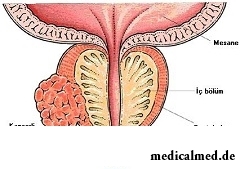





Prostate cancer
General characteristic of a disease
 Prostate cancer or prostate cancer – the malignant disease caused by a hormonal imbalance in the man's organism, and in particular the increased testosterone level.
Prostate cancer or prostate cancer – the malignant disease caused by a hormonal imbalance in the man's organism, and in particular the increased testosterone level.
Symptoms of a prostate cancer are most often diagnosed for men 55 years are more senior. The exception is left by one of the most aggressive forms of a prostate cancer – prostate sarcoma. It can occur also at young men.
Origins of a prostate cancer are authentically not studied today. It is considered that increase in level of testosterone and formation of cancer nodes – explicit symptoms of a prostate cancer - is connected with disturbances in work of gipotalamo-pituitary system of the person. They lead to the general failures in process of synthesis of hormones and to formation of atypical cells. But the exact reason of these disturbances for medicine is not known.
To factors, provoking development of a prostate cancer, except age carry also genetic predisposition to a disease, the use of a large amount of fats of animal origin, an adverse ecological situation, and also existence at the man of chronic adenoma of a prostate.
The prostate cancer is characterized by a slow current. Usually from the moment of formation of a tumor before development of metastasises of a prostate cancer there pass not less than 10 years. More others are subject to a disease of the African-American man, Asians are least of all inclined to a prostate cancer.
Symptoms of a prostate cancer
Disease prematurity almost asymptomatic. With growth of a tumor the first symptoms of a prostate cancer – a problem with an urination begin to be shown. It can be complicated or speeded up depending on localization and the sizes of a tumor. At some forms of a prostate cancer at the patient the acute delay of an urination develops.
At spread of a tumor out of limits of body the prostate cancer can be followed by an incontience of the urine complicated by defecation, availability of blood in excrements. With metastasises carry also renal failure caused by germination of a tumor to mouths of ureters to symptoms of a prostate cancer.
At late stages of a prostate cancer symptoms of a disease are caused by mass distribution of metastasises to bones, lymph nodes, a liver, lungs. Thereof the patient with metastasises of a prostate cancer can have a strong pain syndrome, limited mobility, puffiness, exhaustion and anemia.
Diagnosis of a prostate cancer
The preliminary diagnosis "prostate cancer" is established on the basis of complaints of the patient and results of a manual rectal research. It is carried out by the doctor-urologist and in case of detection of nodes in a prostate the patient goes for further inspection.
The following step in diagnosis of a prostate cancer – the test for the level of the prostatic specific antigen (PSA). The increased concentration of this specific protein in the man's blood – one of symptoms of a prostate cancer. Normal the DOG level should not exceed 4 ng/ml.
By means of transrectal ultrasonography (TRUZI) it is possible to gain an exact impression about the sizes, a form and localization of a tumor. The final diagnosis "prostate cancer" is established on the basis of data of the biopsy which is carried out by means of introduction of the ultrasonic sensor with a needle through an anus of the patient.
For definition of a stage of a prostate cancer additional examinations are conducted: Ultrasonography, computer and magnetic and resonant tomography of bodies and lymph nodes of a basin, chest X-ray, computer scanning of bones of a skeleton.
Stages of a prostate cancer
Depending on extent of distribution of metastasises of a prostate cancer distinguish 4 stages of a disease.
I and II stages of a prostate cancer are characterized by localization of a tumor within a prostate. At the III stage of a prostate cancer the tumor metastasizes in the next lymph nodes, bodies and pelvic bones. Extensive innidiation in the remote bodies and lymph nodes is characteristic of the IV stage of a prostate cancer.
Except classification of a prostate cancer by stages there is also alphabetic TNM system for differentiation of tumors. "T" designates the sizes of a tumor, "N" - existence of metastasises of a prostate cancer in regional lymph nodes, and "M" - innidiation in other bodies.
Cancer therapy of a prostate

At a stage of a prostate cancer when the tumor is in limits of body, the major role is played by surgical treatment. The prostate cancer at an early stage is stopped by a radical prostatectomy – full removal of a prostate and nearby lymph nodes.
At high risk of a recurrence of a prostate cancer the patient goes for postoperative remote beam radiation. Except it in cancer therapy of a prostate at a stage of I and II also the brachytherapy – local beam radiation is used by radioactive granules.
In cancer therapy of a prostate with metastasises the main method – hormonal therapy. Its purpose – as much as possible to reduce testosterone level in an organism of the man and, thus, to stop progressing of a prostate cancer.
Hormonal cancer therapy of a prostate can be surgical with full removal of testicles (orkhiektomiya) or medicamentous. The second way of castration of the man is carried out by means of injections by the drugs blocking production of hormones in a hypophysis - testosterone stimulators. The maximum hormonal blockade in cancer therapy of a prostate is reached by complex use of both methods.
Hormonal cancer therapy of a prostate can continue up to 2 years, and only in case of nonsensitivity of a tumor to the patient's drugs with metastasises of a prostate cancer goes to chemotherapy. It can be oral or injection.
Strong pain syndrome – one of the most widespread complications of a prostate cancer with metastasises. Frequent practice in palliative (facilitating a state) cancer therapy of a prostate – purpose of analgetics, from simple to drugs of prescription narcotic group, so-called opiates.
The educated person is less subject to brain diseases. Intellectual activity promotes formation of the additional fabric compensating sick.

Health and attractiveness - eternal values, pursuing which people often use the most unusual ingredients and technicians...
Section: Articles about health
On health of the person physicians know about salutary action of animals long ago. About 7 thousand years ago great Hippocrates recommended to the patients riding walks for strengthening of a nervous system and increase in vitality....
Section: Articles about health
The naturopathy sometimes moves as the new direction of medicine, something like fashionable hobby, and there is nothing farther from the truth. This most ancient direction, the word "naturopathy" is translated as "treatment by the nature", and, no doubt, treatment by natural gifts was the first and only, available to the person in ancient times. Despite modern achievements of medicine, the naturopathy remains urgent and today, anyway the person - a part of the nature, and природн...
Section: Articles about health
Stability of a hormonal background is one of the most important conditions of preservation of health of the woman. At the same time endocrine system –...
Section: Articles about health
Memory is an ability of the central nervous system to fix, keep and as necessary to reproduce information on knowledge or skills received by the person or an animal during life. The mechanism of this process is up to the end not studied....
Section: Articles about health
The name of this disease precisely reflects the problem reason: it consists in the bra fastener pressure upon a certain zone of a back. At the same time one of vertebrae of chest department of a backbone is as if blocked and loses mobility, and the loading falling on it is distributed on the next vertebrae. At 70-80% of women local pains in a backbone point on which the fastener of the often put most on bra presses result....
Section: Articles about health
Each of us repeatedly noticed that the people having the same passport age are sometimes not similar on one-years at all. One...
Section: Articles about health
All parents are ready to what the baby often and pisat much. Since then, as the absorbing diapers strongly became current, keeping of the kid in dryness does not represent any problems. But if the grown-up kid continues to urinate in panties, parents of a nacha...
Section: Articles about health
Scientists have no unambiguous opinion on a proximate cause of emergence of a carcinoma cutaneum today. Only the factors promoting development of this illness are precisely established. Treat them: long impact on skin of ultraviolet rays, radiation exposure, thermal injuries, injuries of skin by aggressive chemicals (pitches, acids, alkalis, etc.), genetic predisposition (existence of malignant new growths of skin in the family anamnesis), at...
Section: Articles about health
Each person supports all life a SARS about 200 times. The peak of incidence falls on cold season, but to get sick from temperatures...
Section: Articles about health
What they, women? Beautiful, gentle, passionate and at the same time windy, gusty, and nervous. And what is stranger: have all these qualities of the woman at the same time. But here only the mood their time sharply changes on completely opposite: in the morning...
Section: Articles about health
Each failure in work of bodies and systems of a human body is, as a rule, shown by the whole complex of symptoms. In particular, malfunctions with health often cause emergence of cosmetic defects in the form of rashes on a face. Experienced doctors know that localization of heat-spots usually depends on what disease the patient has....
Section: Articles about health
The number of long-livers is very small. One person from 5 thousand lives up to age of 90 years, and the centenary boundary steps only about...
Section: Articles about health
Milk and products of its processing by right occupy one of the main places in a diet of the modern person. They contain proteins, necessary for normal life activity, fats, vitamins and microelements, and are an important part of various medical diets....
Section: Articles about health
All know that self-treatment is dangerous. However absolutely it is almost impossible to do without it. Rate of modern life does not allow to handle each small trouble to the doctor and information on ways of independent delivery of health care is quite available. Means, all of us have only one: to learn to give this help competently and in those limits in which it is possible for the person who does not have vocational education....
Section: Articles about health
Eyes – unique body on the structure thanks to which the person obtains about 80% of information on the world around: about a form...
Section: Articles about health
Neurosis is called pathology of a nervous system at which deviations in functioning of the highest nervous processes are observed. Most often - owing to yet not strengthened mentality - children are subject to neurosises. Premises to emergence of such disturbances can become нез...
Section: Articles about health
Sometimes it seems that modern society was divided into two camps: representatives of the first are sure that only the woman has to be responsible for contraception, representatives of the second, respectively, are sure that it is destiny of men. Meanwhile the question of contraception has very many aspects – both psychological, and legal and, of course, medical....
Section: Articles about health
The fatigue, sleep debt, disturbances of food, bad mood, vagaries of the weather – all these circumstances badly are reflected in our vn...
Section: Articles about health
Cold – a state known to everyone which is followed by cold, cough, high temperature, a pharyngalgia. Often the first that we begin to do in hope again to become healthy – to accept medicines which are not always harmless, then...
Section: Articles about health
Tea is loved and use almost everything. This drink has tonic properties, contains the tannins capable to suppress activity of causative organisms. Recently great popularity was gained by teas with vegetable additives. The medicative herbs, spices and fruit which are a part of such mixes enrich drink with vitamins and microelements, increasing its nutritional value and creating additional curative effect....
Section: Articles about health
Life of the modern woman is very difficult. Opportunities to realize itself are wide: it not only education and career, but also most differently...
Section: Articles about health
(Xerostomia) many people consider feeling of a xerostomia small and easily removable inconvenience. This delusion: the symptom can demonstrate existence of serious diseases. It is worth to remember also that saliva performs important functions...
Section: Articles about health
Practically each person is familiar with the annoying, pulling, unscrewing pains caused by overcooling of muscles of a back. In certain cases inflammatory process is not limited to discomfort, being followed by emergence of hypostasis, consolidations, temperature increase. At the wrong treatment the acute miositis can lead to a chronic disease or aggravation of other pathologies of a back (vertebral hernia, osteochondrosis) therefore it is important to pay attention to symptoms of an illness in time and to start to...
Section: Articles about health
One of the useful properties presented to the person by the nature is ability to feel fear. This ability is called a signal...
Section: Articles about health
Dietary supplements (dietary supplements) for the last decades were so thoroughly included into our life that, apparently, it is already impossible to find the person who at least once did not try them. At the same time, most of our compatriots have a vague idea about...
Section: Articles about health
All are familiar with cold, and practically everyone believes that he has sufficient knowledge and experience that correctly to treat it. In practice most of people makes mistakes in attempts to get rid of rhinitis, and divides numerous delusions it....
Section: Articles about health
